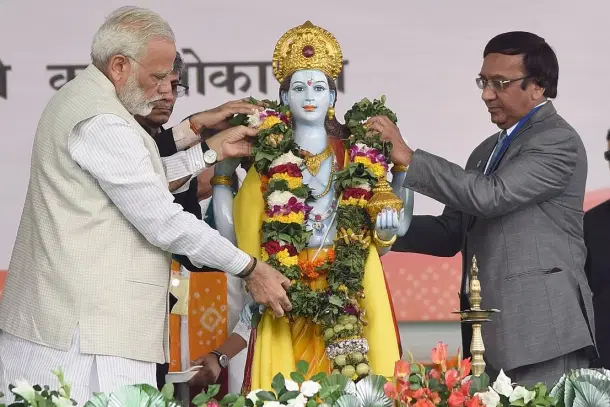Science
Inaugural Ayurveda Day: Recognising The Timeless Wisdom For Global Health
Rudraksh Aneja
Sep 24, 2025, 03:09 PM | Updated 03:09 PM IST
Save & read from anywhere!
Bookmark stories for easy access on any device or the Swarajya app.


This year, the Government of India has designated September 23 as the official date for Ayurveda Day, marking a departure from the previous practice of celebrating it on Dhanteras, which was based on the variable lunar calendar.
This change represents more than just a practical adjustment. It aligns with the autumnal equinox, a time when day and night are in perfect balance, symbolising the core Ayurvedic principle of harmony between the body, mind, and spirit.
This is the essence of Ayurveda, as Charaka, an ancient Indian physician and scholar, said, “Ayurveda is the most sacred science of life, beneficial to humans both in this world and the world beyond. A physician who fails to enter the body of a patient with the lamp of knowledge and understanding can never treat diseases.”
This resonates deeply with Ayurveda’s belief in the individual's inherent ability to maintain health and harmony through self-awareness and connection to nature. Charaka believed that health resulted from the balance of the three doshas (bioenergies): vata (air), pitta (fire), and kapha (earth and water) and that disease arose from their imbalance. Ayurveda's treatment methods focus on addressing the root causes of illness, such as lifestyle, habits, diet, and emotional health, rather than simply treating symptoms.
For decades, Ayurveda was often sidelined, treated as peripheral to the country's mainstream healthcare priorities by various administrations, overlooking its potential to play a central role in the national healthcare framework. This neglect resulted in missed opportunities to integrate traditional medicine with modern health systems and harness its benefits for public health and wellness.
A significant turning point came on November 9, 2014, when the Ayurveda, Yoga, Siddha, Unani, and Homoeopathy (AYUSH) sector was elevated to a full-fledged ministry. This move granted greater autonomy, resources, and policymaking authority, marking a formal recognition of AYUSH as a core element of India's public health policy and cultural heritage. Since then, the sector has steadily progressed towards its $200 billion target, strengthening India's healthcare system, contributing to its economy, and enhancing its cultural soft power globally.
Tapping the Untapped Commercial Potential of Ayurveda
The demand for Ayurvedic and herbal products, including beauty care and nutraceuticals, is rapidly growing in international markets, giving India an opportunity to establish itself as a global leader, much like Korea’s K-beauty or Japan’s J-beauty. According to a Deloitte-FICCI report, India has the potential to create “A-beauty”, combining Ayurvedic traditions with modern efficacy to offer high-performance products globally.
A notable figure to mention is Horst Rechelbacher, the famed founder of the iconic cosmetic company Aveda, who drew deep inspiration from Ayurveda after a retreat in India and went on to adapt Ayurveda’s holistic philosophy into his global beauty brand. Unlike chemical-heavy beauty routines, Ayurveda emphasised balance, linking inner wellbeing with outer radiance. Horst translated this into rituals such as dry brushing, plant-based oils, and meditative skincare, proving that India’s ancient wisdom could redefine modern beauty. His journey showed how Ayurveda is not just medicine, but a way of life that connects individual health with the health of the planet, making it timeless, sustainable, and globally aspirational.
Over 50 per cent of consumers are willing to pay a premium for products like herbal tonics and chyawanprash, highlighting the market potential. The AYUSH market has grown exponentially, from USD 2.85 billion in 2014 to USD 43.4 billion in 2023.
This growth presents an opportunity for India to leverage its rich heritage and create a globally recognised brand, positioning Ayurvedic products as sustainable, effective, and aligned with modern wellness trends. India is well-placed to lead the future of global wellness.
India’s Soft Power in Global Wellness
In recent years, Ayurvedic principles have entered wellness conversations across Europe and America. Clinics offering panchakarma detox therapies, Ayurvedic-inspired diets, and herbal formulations from India are gaining significant traction. Western companies now produce and sell products such as turmeric lattes, ashwagandha supplements, and herbal teas, which stand as a testament to Ayurveda’s growing influence globally.
While rigorous scientific validation of all Ayurvedic practices is still ongoing, the holistic concepts of dosha balance and detoxification resonate with a growing demographic seeking alternatives to conventional, reductionist medical models. Ayurveda’s integration into global wellness trends highlights the rising recognition of India’s soft power and its cultural impact on health and lifestyle.
Additionally, AYUSH exports have seen remarkable growth, rising from USD 1.09 billion in 2014 to USD 2.16 billion in 2023, marking a significant leap in global demand for Ayurvedic products. India is also taking important international steps to promote Ayurveda. During the visit of the Mauritian Prime Minister to India, Modi spoke about extending India’s cooperation through the AYUSH Centre of Excellence, with the first Jan Aushadhi Kendra outside India now established in Mauritius.
India has also decided to extend its cooperation in establishing an AYUSH Centre of Excellence at the 500-bed Sir Seewoosagur Ramgoolam National Hospital in Mauritius, further showcasing India's global leadership in healthcare.
Growth and Global Expansion of the AYUSH Sector
To support this growth, the Ministry of AYUSH launched the Central Sector Scheme for Promotion of International Co-operation in AYUSH, helping Indian manufacturers and service providers. The Ministry has signed 24 MoUs with foreign nations, 40 with international institutes for research, and 15 for setting up AYUSH Academic Chairs abroad.
It has also established 39 AYUSH Information Cells in 35 countries and launched the AYUSH Export Promotion Council to address export challenges. Collaborations with global institutions for research, including on COVID-19 mitigation through Ayurveda, and the certification of 31 Ayurvedic drug manufacturers further enhance the global reach of AYUSH products.
A Cost-Effective Solution for Expanding Healthcare Coverage and Reducing Expenditure
Mainstreaming Ayurveda can play a vital role in reducing healthcare expenditures and ensuring broader health coverage, particularly in rural and underserved areas. Ayurveda offers a cost-effective alternative to conventional medicine, especially for managing non-communicable diseases (NCDs) such as hypertension, diabetes, and arthritis, which often require long-term and expensive treatments in the allopathic system.
The cost of hospitalisation for NCDs is significantly higher in private hospitals, at ₹11,552 per stay, compared to ₹4,935 in public facilities. By focusing on preventive care and addressing lifestyle-related disorders, Ayurveda can reduce the need for costly hospitalisations and surgeries, ultimately easing the financial burden on both individuals and the healthcare system.
Furthermore, Ayurveda promotes the use of local medicinal plants and therapies that are both eco-friendly and cost-effective. The holistic approach of Ayurveda, which focuses on balancing the mind, body, and spirit, can prevent the onset of many chronic diseases, thereby reducing the need for expensive treatments in the future.
By shifting the focus to preventive healthcare, Ayurveda can help manage the rising costs of diseases such as diabetes and cardiovascular conditions, which are major contributors to India’s healthcare expenditure.
To Conclude..
By integrating Ayurveda with modern healthcare systems, India can ease the burden on both public and private institutions, providing a sustainable solution to the rising costs of modern medicine.
Ayurveda’s global recognition not only highlights its cultural and therapeutic value but also allows India to position itself as a leader in the global wellness space. Leveraging Ayurveda’s rich, ancient heritage through initiatives like the National AYUSH Mission and growing exports will strengthen India’s economic growth and soft power, further solidifying its place in the global health dialogue.
Ayurveda, with its holistic approach, is set to revolutionise India’s healthcare landscape while contributing to global health and wellness, reflecting India’s leadership in both culture and medicine.





